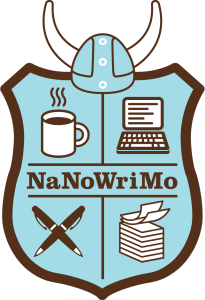Tags
Related Posts
Share This
NaNoWriMo at SFUAD
No writer’s block here! For the month of November, 18 SFUAD students are combating writers’ infamous procrastination by signing on to participate in National Novel Writing Month.
More commonly referred to as NaNoWriMo, National Novel Writing Month began in 1999, and has since grown into a nonprofit organization with a global following. Aspiring novelists can sign up on the NaNoWriMo website, track their daily progress and average word counts, and connect with other writers for motivation and communal support. The goal? A 50,000 word novel by 11:59 pm on Nov. 30.
“My daily average is about 1,600 words a day,” says freshman creative writing major Charlotte Renken, one of the admins on the SFUAD NaNoWriMo Facebook page. This is her third year participating in the event.
“It’s going great so far,” she enthuses, dishing the dirt on her project this year, which involves a vegan surviving the zombie apocalypse, and is her first foray into humor writing.
Nicholas Thomas, a fellow scrivener, sees NaNoWriMo as a stepping stone toward working on his larger project, a multi-book exploration of the world of Eldali.
“This is just a springboard, I’m gonna keep working on it, but it (NaNoWriMo) is a great way to get shit done!” says Thomas, who, a huge fan of the works of J.R.R. Tolkien, has been developing the fantasy world saga and its inhabitants for several years.
Opinions on NaNoWriMo’s effectiveness and usefulness are divided, with many proponents saying it’s an effective tool for pumping out a first draft, no matter how bad, while others believe it puts undue stress on writers and therefore undermines the writing process and the work being produced.
“NaNoWriMo epitomizes the desires and the impatience of instant culture,” says James Reich, a faculty member in the Creative Writing and Literature department who is strongly anti-NaNoWriMo. “A writer employs long term self-discipline, not convenient gimmicks. When you start reaching for an arbitrary word limit, or a calendar date, the work always suffers.”
Renken has a different view. “The first draft is gonna suck, it has to suck, but you need to get it out! You can revise it later, and it’s always a good endeavor to write more than you normally would.”
Thomas agrees, although he admits that trying to average 2,000+ words a day while a full-time student is challenging. “I’m actually ahead on my word count though, and it’s only my first time doing NaNoWriMo!” By Nov. 10, he needed to have 15,000 words. He had 18,347.
NaNoWriMo also gives writers, normally a solitary breed, the chance to draw inspiration and motivation from their peers. In Santa Fe alone, 624 people are registered for the challenge. Both Renken and Thomas agree that writing in a group makes the experience easier, which is why both participate in “write-ins” at the Fogelson Library and at various locations around town such as the Jean Cocteau Theater and Java Joe’s Coffee. At the write-ins, the group is silent and intently focused on their work, the only sound the tapping of fingers on keyboards. The group also works to keep each other off distraction websites like Facebook. In addition, Renken says that there are games designed to help people struggling to reach their daily word count.
“Sometimes we have Word Wars, where a person starts a timer and everyone has to write as much as they can as fast as they can in that time. Whoever has the most words at the end wins!”
Although the goal is 50,000 words, Renken says that even getting 10,000 is a win because it motivates the writer to stop worrying and actually write. “You have to give yourself permission to suck!” she says, laughing.
All over campus, participants can be heard swapping word counts and asking after each other’s progress. Many look stressed and tired, but all are eager to continue going and see where the month takes them. Renken agrees that it can be a strain, but it is well worth the effort.
“It is impossible and crazy, but it’s so much fun!”








 Jackalope Magazine is the student magazine of Santa Fe University of Art and Design. Building on the interdisciplinary nature of our education, we aim to showcase the talent of our university and character of our city.
Jackalope Magazine is the student magazine of Santa Fe University of Art and Design. Building on the interdisciplinary nature of our education, we aim to showcase the talent of our university and character of our city.
Recent Comments